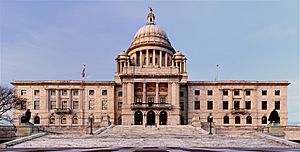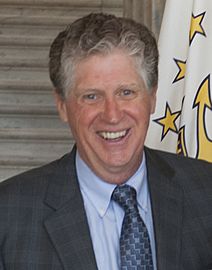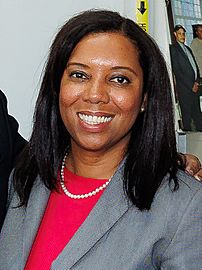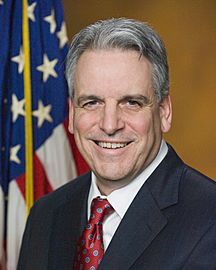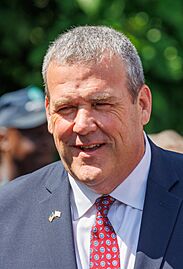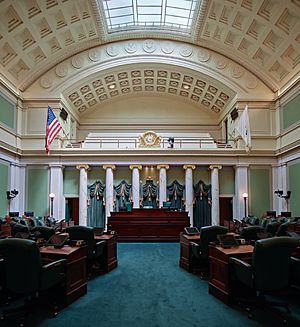Government of Rhode Island facts for kids

|
|
| Polity type | Presidential Republic |
|---|---|
| Constitution | Constitution of Rhode Island |
| Legislative branch | |
| Name | General Assembly |
| Type | Bicameral |
| Meeting place | Rhode Island State House |
| Upper house | |
| Name | Senate |
| Presiding officer | Dominick J. Ruggerio, President |
| Lower house | |
| Name | House of Representatives |
| Presiding officer | Joe Shekarchi, Speaker |
| Executive branch | |
| Head of State and Government | |
| Title | Governor |
| Currently | Daniel McKee |
| Appointer | Election |
| Cabinet | |
| Leader | Governor |
| Deputy leader | Lieutenant Governor |
| Headquarters | State House |
| Judicial branch | |
| Name | Judiciary of Rhode Island |
| Chief Justice | Paul Suttell |
| Courts | Courts of Rhode Island |
| Rhode Island Supreme Court | |
| Chief judge | Paul Suttell |
| Seat | Providence County Courthouse, Providence |
The government of the state of Rhode Island works to serve its people. It gets its rules from several important documents. The main ones are the Rhode Island Constitution, the General Laws, and special orders from the governor.
Just like the Government of the United States, Rhode Island's government has three main parts, called branches. These are the executive, legislative, and judicial branches. Each branch has different jobs to make sure the state runs smoothly.
Contents
Making Laws in Rhode Island
The part of the government that makes laws in Rhode Island is called the Rhode Island General Assembly. This group is made up of two separate parts, which means it is bicameral.
The House of Representatives
One part is the Rhode Island House of Representatives. It currently has 75 members. These members are elected by people from different areas of the state.
The Senate
The other part is the Rhode Island Senate. It has 38 members. Like the House, senators are also elected to represent different parts of Rhode Island.
Both the House and the Senate meet at the Rhode Island State House in Providence to discuss and vote on new laws.
The Executive Branch: Leading the State
The executive branch is in charge of carrying out the laws made by the General Assembly. The main leader of this branch is the Governor.
- Elected Executive Officials of Rhode Island
-
Governor
Daniel McKee (D) -
Lieutenant Governor
Sabina Matos (D)
The people of Rhode Island vote for several important leaders. These include the governor, the lieutenant governor, the secretary of state, the general treasurer, and the attorney general.
The governor has a lot of power to lead the state. They appoint many people to help run different parts of the government. These helpers are called commissioners or directors. The governor's main offices are located in the State House.
Key Roles in the Executive Branch
- Governor: The top leader of the state. They make sure laws are followed and manage state agencies.
- Lieutenant Governor: This role is mostly ceremonial. The lieutenant governor is elected separately from the governor.
- Attorney General: The state's chief lawyer. They represent Rhode Island in legal matters.
- Secretary of State: Manages state records, elections, and business filings.
- General Treasurer: Manages the state's money.
State Departments and Agencies
The executive branch includes many departments and agencies. These groups handle specific tasks to serve the public. Some of the major ones are:
- Department of Administration: Helps manage state government operations.
- Department of Business Regulation: Oversees businesses in the state.
- Department of Corrections: Manages state prisons.
- Department of Education: Oversees public schools.
- Department of Environmental Management: Protects the environment.
- Department of Labor and Training: Helps with jobs and worker training.
- Department of Public Safety: Keeps people safe. This includes the State Police.
- Department of Transportation: Manages roads and transportation.
- Executive Office of Health and Human Services: Oversees health and social services. This includes the Department of Health.
- Rhode Island National Guard: A military force that helps in emergencies.
The Judicial Branch: Interpreting Laws
The judicial branch is responsible for interpreting the laws and making sure they are applied fairly. This branch includes the state's courts.
Rhode Island Courts
The highest court in the state is the Rhode Island Supreme Court. Below the Supreme Court are several other courts that handle different types of cases:
- Superior Court: Handles serious criminal cases and major civil disputes.
- Family Court: Deals with family matters like divorce and child custody.
- District Court: Handles smaller civil cases and less serious criminal cases.
- Workers' Compensation Court: Deals with cases related to workplace injuries.
- Rhode Island Traffic Tribunal: Handles traffic violations.
These courts work together to make sure justice is served in Rhode Island.
Images for kids


